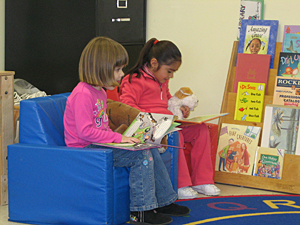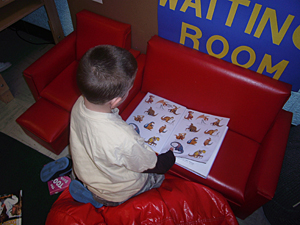- Rozovsky wins prestigious NSF Early Career Award
- UD students meet alumni, experience 'closing bell' at NYSE
- Newark Police seek assistance in identifying suspects in robbery
- Rivlin says bipartisan budget action, stronger budget rules key to reversing debt
- Stink bugs shouldn't pose problem until late summer
- Gao to honor Placido Domingo in Washington performance
- Adopt-A-Highway project keeps Lewes road clean
- WVUD's Radiothon fundraiser runs April 1-10
- W.D. Snodgrass Symposium to honor Pulitzer winner
- New guide helps cancer patients manage symptoms
- UD in the News, March 25, 2011
- For the Record, March 25, 2011
- Public opinion expert discusses world views of U.S. in Global Agenda series
- Congressional delegation, dean laud Center for Community Research and Service program
- Center for Political Communication sets symposium on politics, entertainment
- Students work to raise funds, awareness of domestic violence
- Equestrian team wins regional championship in Western riding
- Markell, Harker stress importance of agriculture to Delaware's economy
- Carol A. Ammon MBA Case Competition winners announced
- Prof presents blood-clotting studies at Gordon Research Conference
- Sexual Assault Awareness Month events, programs announced
- Stay connected with Sea Grant, CEOE e-newsletter
- A message to UD regarding the tragedy in Japan
- More News >>
- March 31-May 14: REP stages Neil Simon's 'The Good Doctor'
- April 2: Newark plans annual 'wine and dine'
- April 5: Expert perspective on U.S. health care
- April 5: Comedian Ace Guillen to visit Scrounge
- April 6, May 4: School of Nursing sponsors research lecture series
- April 6-May 4: Confucius Institute presents Chinese Film Series on Wednesdays
- April 6: IPCC's Pachauri to discuss sustainable development in DENIN Dialogue Series
- April 7: 'WVUDstock' radiothon concert announced
- April 8: English Language Institute presents 'Arts in Translation'
- April 9: Green and Healthy Living Expo planned at The Bob
- April 9: Center for Political Communication to host Onion editor
- April 10: Alumni Easter Egg-stravaganza planned
- April 11: CDS session to focus on visual assistive technologies
- April 12: T.J. Stiles to speak at UDLA annual dinner
- April 15, 16: Annual UD push lawnmower tune-up scheduled
- April 15, 16: Master Players series presents iMusic 4, China Magpie
- April 15, 16: Delaware Symphony, UD chorus to perform Mahler work
- April 18: Former NFL Coach Bill Cowher featured in UD Speaks
- April 21-24: Sesame Street Live brings Elmo and friends to The Bob
- April 30: Save the date for Ag Day 2011 at UD
- April 30: Symposium to consider 'Frontiers at the Chemistry-Biology Interface'
- April 30-May 1: Relay for Life set at Delaware Field House
- May 4: Delaware Membrane Protein Symposium announced
- May 5: Northwestern University's Leon Keer to deliver Kerr lecture
- May 7: Women's volleyball team to host second annual Spring Fling
- Through May 3: SPPA announces speakers for 10th annual lecture series
- Through May 4: Global Agenda sees U.S. through others' eyes; World Bank president to speak
- Through May 4: 'Research on Race, Ethnicity, Culture' topic of series
- Through May 9: Black American Studies announces lecture series
- Through May 11: 'Challenges in Jewish Culture' lecture series announced
- Through May 11: Area Studies research featured in speaker series
- Through June 5: 'Andy Warhol: Behind the Camera' on view in Old College Gallery
- Through July 15: 'Bodyscapes' on view at Mechanical Hall Gallery
- More What's Happening >>
- UD calendar >>
- Middle States evaluation team on campus April 5
- Phipps named HR Liaison of the Quarter
- Senior wins iPad for participating in assessment study
- April 19: Procurement Services schedules information sessions
- UD Bookstore announces spring break hours
- HealthyU Wellness Program encourages employees to 'Step into Spring'
- April 8-29: Faculty roundtable series considers student engagement
- GRE is changing; learn more at April 15 info session
- April 30: UD Evening with Blue Rocks set for employees
- Morris Library to be open 24/7 during final exams
- More Campus FYI >>
3:39 p.m., Feb. 23, 2009----The first class of Head Start preschoolers to experience the Delaware Early Reading First (DERF) project has “graduated,” and University of Delaware researchers say their astonishing success in kindergarten clearly demonstrates the value of early language arts intervention in improving the academic outlook of children from impoverished circumstances.
In 2005, UD College of Human Services, Education and Public Policy faculty Martha Buell and Myae Han of the Department of Human Development and Family Studies and Carol Vukelich, director of the Delaware Center for Teacher Education and L. Sandra and Bruce L. Hammonds Professor in Teacher Education, in cooperation with New Castle County Head Start, received a competitive $3.3 million U.S. Department of Education Early Reading First grant.
The Early Reading First program is designed to create centers of excellence in programs serving young children at risk for school failure.
The project's goals include: increasing children's language and literacy skills; increasing the quality of the preschool literacy environment; and increasing teachers' knowledge and use of research-based reading strategies.
Children in Head Start preschool programs are enrolled because they are considered at risk for academic challenges and failure due to economic circumstances, home language or disability.
Research has shown that, without intervention, these children often start formal schooling lagging behind their peers and usually are unable to close the achievement gap throughout their years in school.
“The income cut-off for families to participate in Head Start is $17,000 a year for a family of four,” Buell said. “Poverty that severe almost guarantees academic problems. Head Start provides each family with a case manager who helps ensure that basic needs for food, shelter and clothing are being met, which allows the children to actively participate in class without worrying about where they'll sleep that night. Our project provides additional enrichment and resources to support their language and literacy development - something that their home environment often lacks.”
Vukelich added, “Research clearly shows that building young children's oral language skills; their knowledge of the alphabet letter names and sounds; print awareness such as reading from left to right; what authors and illustrators do; the differences between a picture, a word and a letter; and phonological awareness or knowledge of the sound structure of our oral language are all key to children's later success as readers.”
Making the leap to kindergarten
Last spring, the researchers followed the 2007 Head Start graduates of their project into kindergarten to see how they were progressing and to gather their teachers' impressions of their language and early reading skill development.
Of the 129 Head Start alumni in 2007, 103 entered kindergarten in the Colonial School District, the project's partnering district, and 97 of those had experienced at least one year of the Delaware Early Reading First program prior to their entry into kindergarten.
These 97 children were tested in May of their kindergarten year (2008) to assess their language and early reading proficiency, and their teachers were asked about their skill development and readiness for first grade.
“The results of the follow-up study indicate that the DERF project graduates performed as well as or better than the general population of children their age,” Han says. “The children's performance is particularly impressive on these measures when one remembers that the majority of the children were not only from low-income families but also came from homes where English was not the primary language spoken.”
In general, the children who had participated in the project produced higher scores on various parts of the standardized Woodcock-Johnson literacy assessment than would be expected of the average population of children beginning first grade. Some of their results were:
*87.6 percent scored in the average range on the letter-word identification subtest, a measure of children's word recognition skills, with 57.7 percent performing at or above the 50th percentile;
*94.8 percent scored in the average range on the story recall subtest, a measure of children's oral expression skills, with 72.2 percent scoring at or above the 50th percentile;
*68.0 percent scored in the average range on the understanding directions subtest, a measure of children's short-term memory and receptive vocabulary, with 40.2 percent scoring at or above the 50th percentile; and
*88.7 percent scored in the average range on the word attack subtest, a measure of children's decoding skills, and 71.1 percent of the children obtained scores at or above the 50th percentile.
In addition, 84.5 percent achieved a standard score in the average range on the Peabody Picture Vocabulary Test-IV, a measure of receptive vocabulary. Given that 70 percent of the children came from families who described their home language as Spanish, the data show that these children made considerable gains in their acquisition of English vocabulary.
Teachers also rated the children's readiness on questions regarding social development, school-specific instrumental development, reading and writing, logical thinking and the use of numbers, and perceptual-motor development.
Teachers' judgments of the Delaware Early Reading First graduates' development were very positive, with all but 14 of the 97 children judged to be in the intermediate to proficient stage of development on each rated skill in the assessed domains.
“We were delighted with the children's performance on these measures,” Vukelich said. “Our Early Reading First project, including New Castle County Head Start and Colonial School District kindergarten teachers, can take great pride in how well prepared these children are for success today and in the future.”
What made the difference?
As Buell pointed out, while “an average performance for these kids would be something to celebrate,” many of them greatly exceeded expectations. So what did the researchers do to make a difference?
For the last four years, Delaware Early Reading First has assisted three Head Start preschools in New Castle County that each serve about 75 children with services and materials based on recent research that has clarified exactly how children learn to read.
DERF provides ample literacy materials, ongoing professional development and onsite coaching to support teachers' use of research-based reading strategies and developmentally appropriate literacy instruction. The children are exposed to quality storybook reading, alphabet and phonological awareness instruction and play-based literacy activities each day in the classroom.
Master's-level teachers specially trained in reading and literacy provide the onsite coaching, while UD graduate students also participate in one-on-one tutoring and assist the researchers with data collection.
The project has received attention and visitors from other Head Start programs in Delaware and nearby Maryland, according to Buell.
“Head Start began in 1965 with the idea that it would be a laboratory where new approaches could be tried,” she said. “The federal government wants these centers to be examples of best practices. We feel like we're making progress in the area of early literacy intervention, and we're gratified to serve as a resource for other Head Start programs in Delaware and Maryland and the region.”
Article by Beth Chajes
Photos courtesy of Carol Vukelich




